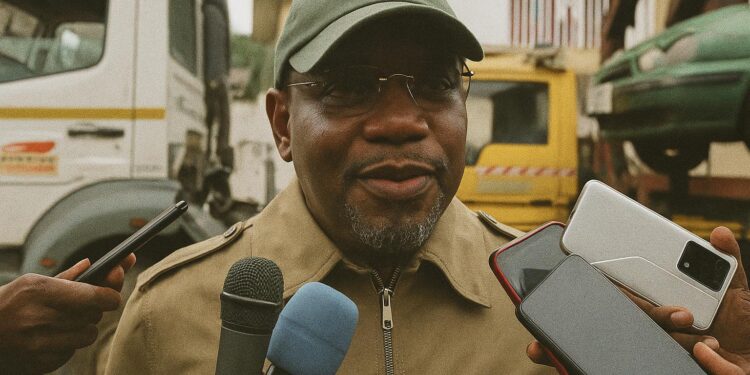A Ministerial Tour Sets the Tone for Civic Cleanliness
In the early hours of the first Saturday of the month, Minister of Urban Sanitation, Local Development and Road Maintenance Juste Desiré Mondelé criss-crossed Brazzaville’s arterial boulevards. His presence, accompanied by arrondissement administrators and municipal police, lent both visibility and a measure of gravitas to the inaugural round of a new governmental directive. The minister’s stated purpose was neither punitive nor cosmetic; it was, he argued, an appeal to collective responsibility aimed at reclaiming public spaces that have gradually been encroached upon by informal parking, makeshift kiosks and solid-waste deposits.
From Circular to Street-Level Enforcement
The campaign finds its legal anchor in a circular dated 2 July, which stipulates a city-wide operation of eviction and sanitation to occur every first Saturday. By grounding the intervention in a predictable cadence, the ministry hopes to move beyond episodic crackdowns towards an institutionalised routine. Comparative studies by UN-Habitat note that regularity is a decisive factor in entrenching behavioural change (UN-Habitat, 2022). Brazzaville’s leadership appears to have internalised that lesson, synchronising municipal services, police units and neighbourhood committees for simultaneous deployment.
Public Health, Urban Order and the Regional Context
The stakes transcend visual tidiness. The World Health Organization estimates that inadequate urban sanitation in Sub-Saharan Africa contributes to more than five percent of annual disease burden (World Health Organization, 2023). Blocked drainage exacerbates flooding, while abandoned vehicles become breeding grounds for mosquitoes carrying dengue and malaria. Mondelé’s rhetoric therefore frames the operation not merely as an aesthetic upgrade but as a preventive public-health measure consonant with the African Union’s Agenda 2063 for environmentally sustainable cities.
Balancing Property Rights and Collective Necessity
Yet the minister’s call for vehicle owners to remove cars from ‘grand arteries’ without simply shifting congestion into side streets touches on a delicate legal balance. Urban-planning scholars point out that eviction initiatives often founder when they lack clear guidelines for alternative parking or compensation (African Development Bank, 2021). In Brazzaville, officials stress that the directive targets only egregious obstruction cases and that residents are encouraged to use private parcels or designated municipal lots. Early anecdotal evidence suggests a measured compliance, aided by the administration’s decision to issue warnings before sanctions.
Civic Participation as a Cornerstone of Sustainability
Civil-society organisations such as Acteurs Verts have welcomed the ministerial outreach component, noting that participatory clean-up days in Kinshasa and Kigali have significantly reduced solid-waste volumes. In televised remarks, Mondelé evoked a ‘civic renaissance’ in which neighbourhood committees will receive logistical support—gloves, waste sacks, rudimentary tools—to ensure that the initiative does not become an exclusively top-down exercise. Political analysts in Brazzaville observe that successful integration of citizens into municipal tasks can strengthen social cohesion and reinforce trust in state institutions.
Economic Imperatives and Prospects for Scaling
Beyond health and governance, the programme has economic implications. The Ministry of Tourism anticipates that cleaner public spaces could enhance the capital’s attractiveness for regional conferences and cultural events, feeding into the national diversification agenda outlined in the Plan National de Développement. Moreover, the Directorate of Small and Medium Enterprises is exploring micro-concessions for recycled waste streams, mirroring models piloted in Abidjan and Lagos. Such initiatives align with the African Circular Economy Alliance’s findings that urban waste-to-value chains can create up to fifty jobs per ton of recycled material (African Circular Economy Alliance, 2022).
An Incremental Path Toward Sustainable Urbanism
At the close of his tour, Mondelé addressed journalists with a cautionary optimism: sustainable urbanism, he argued, is rarely achieved by decree alone but through incremental habits nurtured across institutions and households alike. Preliminary assessments suggest tonnage of removed waste exceeded projections, yet officials concede that measurement of long-term success will hinge on reduced recurrence of informal dumpsites and improved drainage performance during the forthcoming rainy season. A follow-up evaluation, slated for the ministry’s fourth-quarter report, is expected to provide empirical data on public-health indicators and traffic fluidity.
Strategic Significance for Congo-Brazzaville’s Diplomatic Narrative
In the broader diplomatic arena, the operation dovetails with Congo-Brazzaville’s commitments under the Paris Climate Agreement’s Nationally Determined Contributions, highlighting a domestic effort to integrate environmental stewardship into economic modernisation. Foreign observers note that sustained progress in urban sanitation can bolster the country’s standing in regional forums such as the Economic Community of Central African States, where urban resilience is rising on the agenda. By portraying sanitation as an instrument of both public welfare and international credibility, Brazzaville positions itself as a constructive actor in continental development dialogues.











































